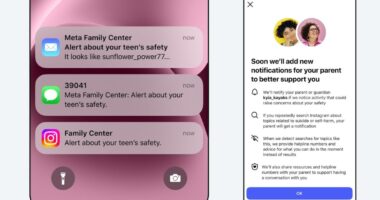Share this @internewscast.com
The 2024 reveal trailer for Possessor(s), the latest game from Heart Machine, creators of Hyper Light Drifter, left a lasting impression on me. Captivating visuals showcased a 2D character navigating and battling through side-scrolling terrains, set against stunning 3D backdrops, all accompanied by powerful, atmospheric music. Though the full game, released this month, didn’t quite recapture the trailer’s initial magic, I found myself glad I persevered to see it through to the end.
In Possessor(s), players step into the shoes of Luca, a young girl possessed by Rehm, a demon from another dimension. Following a disaster, Rehm saves Luca by fashioning legs for her, binding them together as host and guest. Their relationship is fraught with tension, marked by constant bickering, which at times made it difficult for me to engage with them. However, as the game progresses, their dynamic evolves, revealing deeper layers of understanding about each other and their respective worlds.


Heart Machine bills Possessor(s) as a “fast-paced action side scroller,” yet it firmly adheres to the mold of a classic Metroid or Castlevania game. Players navigate an interconnected world filled with unique zones, frequently consulting the map to uncover new paths, and acquiring upgrades like a wall run to unlock previously inaccessible areas. Early in the game, players obtain a whip, which serves as both a tool for traversing large gaps and a primary weapon in combat.
Combat is reminiscent of platform fighters such as Super Smash Bros., offering fast-paced, impactful battles. Players wield everyday-inspired weapons, like a hefty baseball bat for close encounters, a cellphone’s electric blast for crowd control, and demonic silverware for attacking distant foes. Mastering parrying is crucial for success in these encounters.

Image: Devolver Digital
Initially, Possessor(s) presents a significant challenge. Common enemies pack a punch, and a momentary lapse in concentration or a poorly-timed combo can lead to an untimely demise. Death transports players back to the game’s version of Dark Souls bonfires, and the journey to reclaim lost ground is often perilous and demanding. The game also incorporates a Souls-like healing system, substituting flasks with painkillers for health recovery.
Usually, I like that kind of challenge, but something about Possessor(s)’s level and enemy design often made the early game feel more frustrating than fun for me. I also got very lost after the first few hours, exploring way more of the map than I needed to because I couldn’t figure out how to get past some mysterious walls with glowy cracks on them. I contemplated putting down the game for good.
However, after finally learning how to open those walls (use the whip!), getting a few health and painkiller upgrades, and seeing more nuance to Luca and Rhem’s relationship, I started to enjoy the game much more. I finally settled into the satisfying Metroid loop of exploring a new area, finding a new upgrade, using that to get to the next boss, getting the next MacGuffin, and then doing it all over again in the next zone.

Possessor(s) didn’t possess me in the way that I expected it might. Based on my initial impressions, the game seemed cooked in a lab to appeal to my exact tastes. I just needed to have some patience. The game culminated in a final level that really put my skills to the test and a striking battlefield for the final boss. As I watched the credits roll, I realized it had all finally evoked some of those feelings I had watching the game’s first trailer.
Possessor(s) is out now on PC and PS5.







